Pumpkin seeds are popular for humans, but can dogs eat pumpkin seeds? In this article, the benefits and potential risks of feeding pumpkin seeds to dogs, as well as how to prepare them safely, will be thoroughly examined. The nutritional value of pumpkin seeds and how they can benefit a dog’s diet will be discussed too.
Dogs can eat pumpkin seeds as long as they are given in moderation, unsalted, and without the shell. They are a good source of protein, healthy fats, and minerals and provide many essential nutrients such as zinc, magnesium, and iron.
Pumpkin seeds also contain antioxidants and high fiber content which can help to promote healthy digestion and regular bowel movements.
Moreover, as it is a fact that pumpkin seeds can provide many benefits for dogs, they should not be used as a replacement for a well-balanced diet. Pumpkin seeds should be given as a treat or supplement and not make up a significant portion of your dog’s diet.
Also, it is good to recall that while pumpkin seeds are generally safe for dogs, they should not be given to dogs with a known allergy or to dogs with certain health conditions, such as pancreatitis, as they may not be well-tolerated.
Can Dogs Eat Pumpkin Seeds?
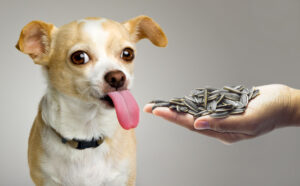
Dogs can eat pumpkin seeds. They are a good source of protein, healthy fats, and various minerals, but they should be given in moderation as they are high in calories. They are a great source of many essential nutrients for dogs, including zinc, magnesium, and iron.
Also, pumpkin seeds contain antioxidants that can help to improve your dog‘s immune system and protect them from certain types of cancer. Additionally, the seeds’ high fiber content can help to promote healthy digestion and regular bowel movements.
Moreover, giving them to your dog unsalted, raw, and without the shell is recommended, as the shell can be complex for them to digest and can cause intestinal blockage.
Pumpkin seeds can also have other benefits for dogs, such as:
- Helping with bladder control: Pumpkin seeds contain amino acids that may help dogs prone to urinary incontinence.
- Improving coat and skin health: The essential fatty acids in pumpkin seeds can help promote a shiny coat and healthy skin.
- Reducing inflammation: Pumpkin seeds contain anti-inflammatory compounds that may help to reduce inflammation in the body and alleviate conditions such as arthritis.
Are pumpkin seeds safe for dogs to eat?
Pumpkin seeds are generally safe for dogs to eat when given in moderation, unsalted, and without the shell. They are a good source of protein, healthy fats, and minerals and provide many essential nutrients such as zinc, magnesium, and iron.
Pumpkin seeds also contain antioxidants and high fiber content which can help to promote healthy digestion and regular bowel movements.
Also, it is worth noting that while pumpkin seeds are generally safe for dogs, they should not be given to dogs with a known allergy to them or dogs with certain health conditions, such as pancreatitis, as they may not be well-tolerated.
Can dogs eat raw pumpkin seeds?
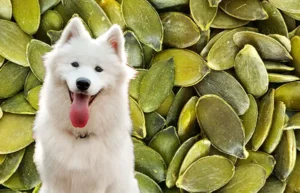
Dogs can eat raw pumpkin seeds. They are a good source of protein, healthy fats, and various vitamins and minerals. However, it is best to give them in moderation as too many pumpkin seeds can cause an upset stomach. It’s recommended to remove the shell before giving it to dogs as they may choke on it.
Additionally, raw pumpkin seeds should be cleaned and rinsed thoroughly to remove any dirt or debris before giving them to your dog. If you want to give them to your dog, you can do it in small quantities to see how they react. Also, you can provide roasted pumpkin seeds without salt, as it’s not healthy for dogs.
How much pumpkin seeds can dogs eat?

The number of pumpkin seeds a dog can eat will depend on their size, weight, and activity level. As a general guideline, giving a small amount of pumpkin seeds as a treat is best rather than making it a regular part of their diet. A good rule of thumb is limiting treats to 10% of a dog’s daily caloric intake.
However, as a general guideline, you can use the following as a reference:
- For small dogs (up to 20 lb / 9 kg), a few pumpkin seeds (around 5-6) can be given as a treat.
- For medium-sized dogs (20-50 lb / 9-23 kg), around 10-12, pumpkin seeds can be given as a treat.
- For large dogs (50+ lb / 23+ kg), around 15-20 pumpkin seeds can be given as a treat.
Are there any benefits of feeding pumpkin seeds to dogs?
Pumpkin seeds are a good source of protein, healthy fats, and various vitamins and minerals that can benefit dogs.
Here are some other benefits of feeding pumpkin seeds to dogs:
- It can help with digestion.
- Provide a boost of energy.
- Promote healthy skin and coat.
- Rich in antioxidants can help protect dogs from free radicals and support their overall immune system.
- A good source of zinc can help heal wounds and keep healthy skin and coat.
- Rich in magnesium which can help maintain a healthy heart.
- It contains L-tryptophan, an amino acid that can help with anxiety and depression.
- It can help with urinary health by preventing bladder infections and reducing inflammation in the urinary tract.
Pumpkin seeds should only be given to dogs in small amounts as a treat, as they are high in fat and can lead to weight gain if fed in large quantities. Ensure they are roasted and unsalted, as raw or salted seeds may not be safe.
Can eating pumpkin seeds cause any health issues for dogs?
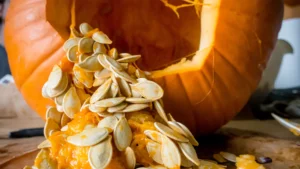
While pumpkin seeds can provide many health benefits for dogs, they should be given in moderation and as a treat, as they are high in fat and can lead to weight gain if fed in large quantities.
Additionally, eating too many pumpkin seeds can cause an upset stomach, including diarrhea and vomiting. It is also important to note that some dogs may be allergic to pumpkin seeds, so it is always best to check with your veterinarian before introducing any new food to your dog’s diet.
Also, pumpkin seeds and other seeds are a choking hazard for dogs, mainly if they are not appropriately chewed before swallowing. So, it’s recommended to feed them in small pieces or grind them before giving them to your dog.
If your dog is showing symptoms such as vomiting, diarrhea, or lethargy after eating pumpkin seeds, you should stop feeding them to your dog.
How to prepare pumpkin seeds for dogs?
Here is a step-by-step process to prepare pumpkin seeds for dogs:
- Rinse and dry the pumpkin seeds
- Preheat your oven to 150-200 degrees Fahrenheit.
- Spread the seeds out in a single layer on a baking sheet
- Roast the seeds in the oven for 10-15 minutes or until golden brown.
- Remove them from the oven and let them cool completely before giving them to your dog.
- Optionally, you can grind the seeds with a food processor to make them easier for your dog to digest, especially if your dog is a senior or has dental issues.
Remember that pumpkin seeds should be unsalted and unseasoned, as salt can harm dogs in large quantities.
Can pumpkin seeds be given to dogs with certain health conditions?
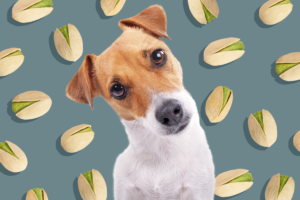
Pumpkin seeds can be beneficial for dogs with certain health conditions. For example, pumpkin seeds can be helpful for dogs with urinary tract infections as they contain compounds that can help reduce inflammation in the urinary tract and prevent bladder infections.
Dogs with digestive issues may also benefit from pumpkin seeds as they contain fiber and healthy fats to help regulate bowel movements.
Additionally, dogs with skin and coat issues may benefit from the zinc and antioxidants in pumpkin seeds which can help support healthy skin and coat.
However, if your dog has a history of pancreatitis, it’s best to avoid high-fat treats like pumpkin seeds. And if your dog is diabetic, it’s best to avoid adding high-carbohydrate treats such as pumpkin seeds to their diet.
Can pumpkin seeds cause intestinal blockages in dogs?
Pumpkin seeds are not likely to cause intestinal blockages in dogs. Still, if they are not appropriately chewed before swallowing, they can become a choking hazard and cause intestinal blockages.
Additionally, if your dog eats many pumpkin seeds, they can cause an upset stomach, including diarrhea and vomiting.
So, if you are giving your dog pumpkin seeds as a treat, you should provide them in small pieces or grind them before giving them to your dog to prevent choking and intestinal blockages.
Also, keep an eye on your dog’s diet and avoid giving them too many high-fat treats, such as pumpkin seeds, as they can cause weight gain and other health problems over time.
Can pumpkin seeds cause upset stomachs in dogs?

Eating too many pumpkin seeds can cause an upset stomach in dogs, including diarrhea and vomiting. This is because pumpkin seeds are high in fat; if a dog eats too many of them, it can cause digestive upset.
It’s better to treat pumpkin seeds to dogs in moderation. Pumpkin seeds should only be given to dogs in small amounts as a treat, as they are high in fat and can lead to weight gain if fed in large quantities.
Additionally, if you are giving your dog pumpkin seeds as a treat, you should provide them in small pieces or grind them before giving them to your dog to prevent choking and intestinal blockages.
If you notice your dog showing symptoms such as vomiting, diarrhea, or lethargy after eating pumpkin seeds, you should stop feeding them to your dog and contact your vet.
Can pumpkin seeds be given to dogs with sensitive stomachs?
Pumpkin seeds can be beneficial for dogs with sensitive stomachs. Still, it’s always best to check with your veterinarian before introducing any new food to your dog’s diet, especially if your dog has any health issues or is on a special diet.
Pumpkin seeds contain a good source of fiber and healthy fats that can help regulate bowel movements. Fiber is beneficial for dogs with sensitive stomachs as it can help to bulk up stools and make them easier to pass.
Moreover, if your dog has a sensitive stomach, give them tiny pumpkin seeds first and gradually increase the amount over time to allow their digestive system to adjust.
However, if your dog shows signs of an upset stomach, diarrhea, or vomiting after eating pumpkin seeds, you should stop feeding them and contact your vet.
It’s good to be mindful of the amount of high-fat treats you give your dog, as they can cause weight gain and other health problems over time.
How to include pumpkin seeds in dogs’ diet?
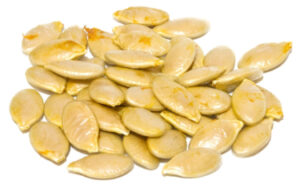
The following are approaches you can adopt to include pumpkin seeds in your dog’s diet:
- As a treat: Pumpkin seeds can be given to dogs, but it’s important to remember to share them in moderation. Start with small amounts and gradually increase the amount over time to allow your dog‘s digestive system to adjust.
- Ground or powdered: You can grind the pumpkin seeds with a food processor or blender to make them easier for your dog to digest. This is especially beneficial for older dogs or dogs with dental issues.
- Mixed with other foods: You can mix a small number of ground pumpkin seeds with your dog’s regular food to boost nutrients.
- Homemade dog food: You can include pumpkin seeds in homemade dog food recipes.
Can pumpkin seeds be used as a training treat for dogs?
Pumpkin seeds can be used as a training treat for dogs as they are a healthy, natural option and are high in protein, healthy fats, and various vitamins and minerals. However, it’s important to remember to give them in moderation as they are high in fat, and too many can cause weight gain.
You can grind the seeds with a food processor to make them smaller and easier to use as a training treat. You can also mix the ground pumpkin seeds with other ingredients, such as yogurt or peanut butter, to make a more palatable treat for your dog.
Remember that pumpkin seeds should be given in small amounts as a treat, not as a substitute for a balanced diet. It’s always best to consult with your veterinarian before introducing any new food to your dog’s diet, especially if your dog has any health issues or is on a special diet.
When using pumpkin seeds as a training treat, monitoring your dog‘s reaction and adjusting the amount given accordingly is essential.
Conclusion
Pumpkin seeds are a healthy and natural option for dogs as they are high in protein, healthy fats, and various vitamins and minerals. They can provide many benefits, such as helping digestion, boosting energy, promoting healthy skin and coat, and supporting the immune system.
However, it’s important to remember to give them in moderation as they are high in fat, and too many of them can cause weight gain and upset stomachs. Pumpkin seeds can benefit dogs with certain health conditions, such as urinary tract infections, digestive issues, and skin and coat issues.
Also, pumpkin seeds can be used as a training treat, but it’s important to remember to give them in small amounts and to consult with your veterinarian before introducing any new food to your dog’s diet.
When preparing pumpkin seeds for your dog, it’s important to rinse and dry the seeds, roast them in the oven at a low temperature and let them cool completely before giving them to your dog. You can also grind the seeds with a food processor to make them easier for your dog to digest, especially if your dog is a senior or has dental issues.
Pumpkin seeds should be unsalted and unseasoned, as salt can harm dogs in large quantities. And, if you notice any signs of discomfort or distress, you should stop feeding them the treat and consult with your vet.
In conclusion, can dogs eat pumpkin seeds? Yes, affirmative. While pumpkin seeds can provide many health benefits for dogs, they should be given in moderation and as a treat. It’s always best to consult with your veterinarian before introducing any new food to your dog’s diet, especially if your dog has any health issues or is on a special diet.


